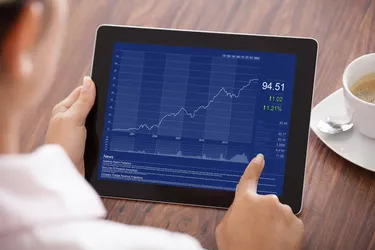
Trading in foreign currencies poses a fast-paced challenge to speculators. The market stays open around the clock, five days a week, and allows you to build several large positions with the use of margin. A little cash can open a big contract in the forex market, meaning high risks as well as potentially high rewards. Before dipping into currencies, make sure you clearly understand the difference between account balance and account equity.
Opening an Account
Video of the Day
Your forex trading begins with a new account funded by "risk capital" -- i.e., cash you can afford to lose. Online trading platforms -- and there are many -- allow transfer of funds directly from your bank account. You can also send a check or money order through the snail mail. The amount of free cash in the account is the balance. Forex accounts hold no stocks, bonds or other securities. They consist of nothing more than open positions, and an available cash balance that will adjust when you add more funds or close a position.
Video of the Day
Forex Contracts
When you trade currencies, you participate in a global spot market in which banks, governments, professional traders and international companies are constantly opening and closing positions. A forex position pits one currency against another. The EUR/USD contract, for example, rises and falls with the U.S. dollar as it trades against the euro. The quoted price on the EUR/USD is the amount in dollars it takes to buy one euro. A contract represents 100,000 units of the first or "base" currency. If the EUR/USD is quoted at 1.40, for example, then one contract's nominal value is $140,000.
Margin
Committing $140,000 in cash to a speculative trade is something only those with plenty of money would care to try. To open up the market a bit, forex brokers allow their traders to use margin -- money that is loaned from the broker -- to open their positions. An account with a 100:1 margin requires only 1 percent of the cash value. That means the above $140,000 EUR/USD contract only requires a commitment of $1,400 in cash from the trader's balance. As cash is committed to open positions, and as these positions fluctuate in value, the equity in the account will rise and fall.
Equity and Maintenance
Equity is the current value of the account and fluctuates with every tick and blip on the trading screen. The account equity consists of the cash balance plus the value (positive or negative) of open positions. As the contracts rise or fall in value, so does the account's total equity. If a trader's open positions lose serious value, his equity may fall below a "margin maintenance level." This means the broker will either require more cash or automatically close out the losing position to prevent any further loss. A typical margin level may be 10 percent of the opening balance. A contract or combination of contracts losing 91 percent of the balance, for example, will trigger a margin call or position closing by the broker.